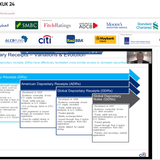According to a report recently published by Fitch, Colombian corporates are feeling the pain caused by inflationary pressures, deteriorating external trading conditions, increased taxes and higher debt servicing costs, leading to a fairly subdued outlook for the region’s capital markets.
Inflation in the country dipped in 2013 but has been on the rise ever since, shooting from 4.46% in July 2015 to 8.6% currently. Last month the Central Bank of Colombia was again forced to hike interest rates by 0.25% to 7.5%, and could hike again if it fails to keep inflation below target.
In 2015 Colombian corporates raised about US$14.2bn of incremental debt raised, 20% of which was issued through debt capital markets (COP1.8bn in the local markets; US$2bn in international markets) and the remaining 80% mainly provided by banks.
While lower issuance historically also means lower refinancing risk, Fitch said corporate leverage is still rising alarmingly fast, and could worsen in 2016. Total debt/EBITDA and net debt/EBITDA was 2.7x and 2.3x, respectively, in 2015, a sharp jump from 2.2x and 1.7x in 2014, driven in part by adverse weather conditions affecting electricity production and a depreciating peso. In July 2014 the peso hovered around COP1840 to the US dollar; it now hovers at around COP2932 to the dollar. An uplift in the many commodities Colombia specialises in (coffee, nickel, and gold) could help ease currency pressure.
“There are many obstacles to liquidity for Colombian corporates. Some include adverse external trading conditions, inflationary pressures, higher debt service cost, volatile foreign exchange rates and a slowdown in consumption,” said Julian Robayo, an associate director at Fitch. “Additionally, tax reform may hurt corporates and return on investment.”
That hasn’t stopped some of the country’s larger corporates from issuing or investors from soaking up their debt. UNE EPM Telecomunicaciones issued COL540bn (US$173.4mn) in 8, 10 and 20-year notes in the local market in June, taking advantage of a brief drop in yields. The same month, Ecopetrol hit the dollar market for a benchmark-sized 2023 bond paying 5.875%. Last week road concessionaire Costera sealed a dual-currency debt package worth about US$500mn earlier this month, consisting of a US dollar bond and inflation-linked local currency bonds and loans. Both the UNE EPM and Ecopetrol deals were massively oversubscribed.
“The fact that these corporates aren’t binging on debt anymore is a good thing for the market as a whole. Yield is still there, existing risks don’t look likely to intensify, particularly with the Fed flattening its trajectory for a rate rise,” one LatAm-focused investor told Bonds & Loans. “The biggest challenge in Latin America and Colombia specifically is organic cashflow growth and FX, which simply means you have to pick your credits wisely and ensure their currency exposures are managed.”
There is also good reason to believe the outlook in Colombia could improve dramatically off the back of a formal peace agreement with the Revolutionary Armed Forces of Colombia (FARC), the country’s infamous Marxist guerrilla group, after over fifty years of conflict. The government said it plans to offer significant tax breaks to entice the private sector into infrastructure and social development projects.
While light on details, the move could be linked to Colombia’s Fourth Generation — or “4G” — plan, a massive infrastructure programme that sees the government fund and stimulate investment into upgrading the country’s roads, bridges, and tunnels.
“Many people, particularly outside of Colombia, downplay the impact conflict has had on the country’s economy. This is a game changer in the long term.”









